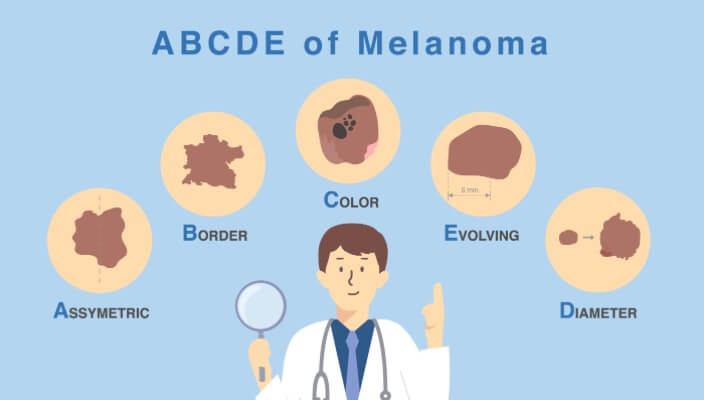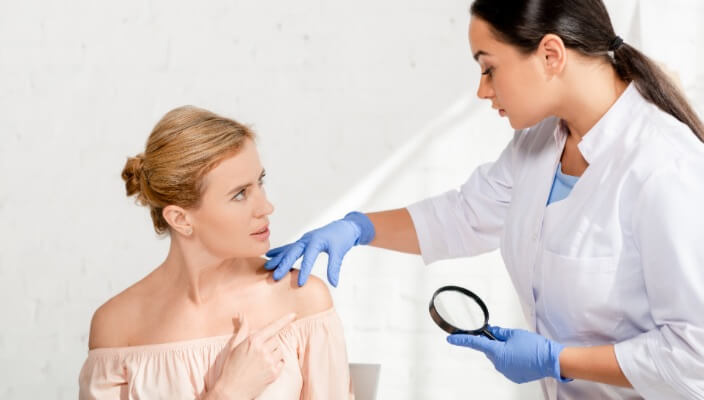Squamous Cell Carcinoma
Basal Cell Carcinoma (BCC): Causes, Symptoms, and Expert Care at Center for Surgical Dermatology
Basal cell carcinoma (BCC) is the most common type of skin cancer, accounting for the majority of skin cancer cases. It originates in the basal cells located in the lowest layer of the epidermis, the outermost layer of the skin. While BCC is generally considered a slow-growing and non-aggressive form of skin cancer, it can still cause significant local tissue damage if not treated early.
Basal cell carcinomas can present on your skin in various forms, including red patches, pink growths, open sores, and shiny bumps. They are commonly caused by overexposure to ultraviolet (UV) rays from the sun or tanning beds. While BCCs are rarely life-threatening when treated properly, early detection and treatment are crucial to prevent complications.
Nearly three million people are diagnosed with basal cell carcinoma each year. This type of skin cancer is most frequently seen in individuals whose lifestyles expose them to high levels of UV rays. Although the average age of BCC patients is declining, it remains most common in people over 40. Those with fair skin, blonde or red hair, and blue, green, or gray eyes are more susceptible. Men are also at a higher risk.
At Center for Surgical Dermatology, we specialize in the diagnosis and treatment of basal cell carcinoma. Our expert team is dedicated to providing personalized care to effectively manage and treat BCC, ensuring the best possible outcomes for our patients. We utilize state-of-the-art technology and advanced treatment methods to deliver optimal results.
If you notice any unusual skin changes or suspect you may have BCC, schedule an appointment with us for a thorough evaluation and tailored treatment plan. Your skin health is our priority, and we are here to help you achieve and maintain healthy, cancer-free skin. Trust our skin cancer experts for comprehensive care and expert management of basal cell carcinoma.
Examples of Squamous Cell Carcinoma






Symptoms of Squamous Cell Carcinoma
- Squamous cell carcinoma usually begins as a dome-shaped bump or a red, scaly patch of skin.
- Rough and crusty and can bleed easily when scraped.
- Changes in existing growths: changes in the appearance of existing skin growths, such as warts or scars.
- Persistent sore: a sore or lump that doesn't heal, or a lesion that keeps recurring.
What Causes Squamous Cell Carcinoma?
- Squamous cell carcinoma (SCC) can affect individuals across diverse backgrounds.
- It is more prevalent in those with regular exposure to direct sunlight, especially in professions or lifestyles that involve significant sun exposure.
- While skin cancer is less common in individuals with darker complexions, they are at an increased risk for SCC in areas of the body not typically exposed to the sun.
Squamous Cell Carcinoma Prevention
Squamous Cell Carcinoma FAQs
Diagnosis involves a biopsy, where a sample of the suspicious area is removed and examined under a microscope. This helps confirm whether the lesion is cancerous and provides information about its characteristics
Treatment options for SCC depend on factors such as the size, location, and stage of the cancer. Common treatments include surgical excision, electrodessication and curettage, cryotherapy, Mohs surgery for more complex cases, radiation therapy, and topical medications.
The frequency of screenings depends on individual risk factors. High-risk individuals, such as those with a history of SCC or other skin cancers, may need more frequent screenings. Consult with your dermatologist to determine the appropriate screening schedule for your situation.
While SCC is usually slower-growing than melanoma, it has the potential to be locally aggressive and may spread to other parts of the body, especially if left untreated. Early detection and treatment are important for preventing complications.
A total body skin exam by a dermatologist is crucial for several reasons. Firstly, it serves as a proactive measure for the early detection of skin cancers, including melanoma, the deadliest form of skin cancer. Skin cancers are often highly treatable when identified at an early stage. A comprehensive examination allows the dermatologist to assess moles, birthmarks, and any unusual skin changes that may indicate potential issues.
Secondly, a dermatologist can identify and diagnose various skin conditions, including dermatitis, psoriasis, and infections. Early detection and treatment of these conditions can prevent them from escalating into more serious health issues.
Furthermore, a total body skin exam provides an opportunity to discuss and address any concerns or questions about skin health, sun protection, and skincare routines. Dermatologists can offer valuable guidance on skin cancer prevention, emphasizing the importance of sun protection measures, such as wearing sunscreen and protective clothing.
Regular skin exams become especially vital for individuals with risk factors, such as a family history of skin cancer, a personal history of sun exposure, or fair skin. Overall, a total body skin exam is a proactive and comprehensive approach to maintaining skin health, preventing skin cancers, and addressing any skin-related issues in a timely manner.
You should apply sunscreen every day. Even on cloudy days and during the winter, UV rays can penetrate the clouds and cause skin damage.
Sunscreen needs time to be absorbed into the skin. Apply it at least 15-30 minutes before going outdoors and reapply every two hours.
From our QualDerm Family of Brands: Non-Melanoma Skin Cancers
Treatment Options for Squamous Cell Carcinoma
- Mohs micrographic surgery
- Excisional surgery
- Cryotherapy (freezing)
- Currettage and Electrodessication
- Chemotherapy
- Radiation
Related Blog Posts

- Skin Cancer
- Skin Exams
It’s time to face the facts: skin cancer can develop in individuals of all skin colors, including those with darker skin tones.
Read More
- Skin Cancer
- General Dermatology
- Skin Exams
Learn the ABCDEs of Melanoma, the deadliest form of skin cancer.
Read More
- Skin Cancer
- Skin Exams
Total Body Skin Exams (TBSEs) are crucial for healthy skin. Learn more about the importance of TBSEs and skin cancer detection.
Read MoreFeatured Products for Sun Protection
Check your local office for current stock!
Check your local office for current stock!
